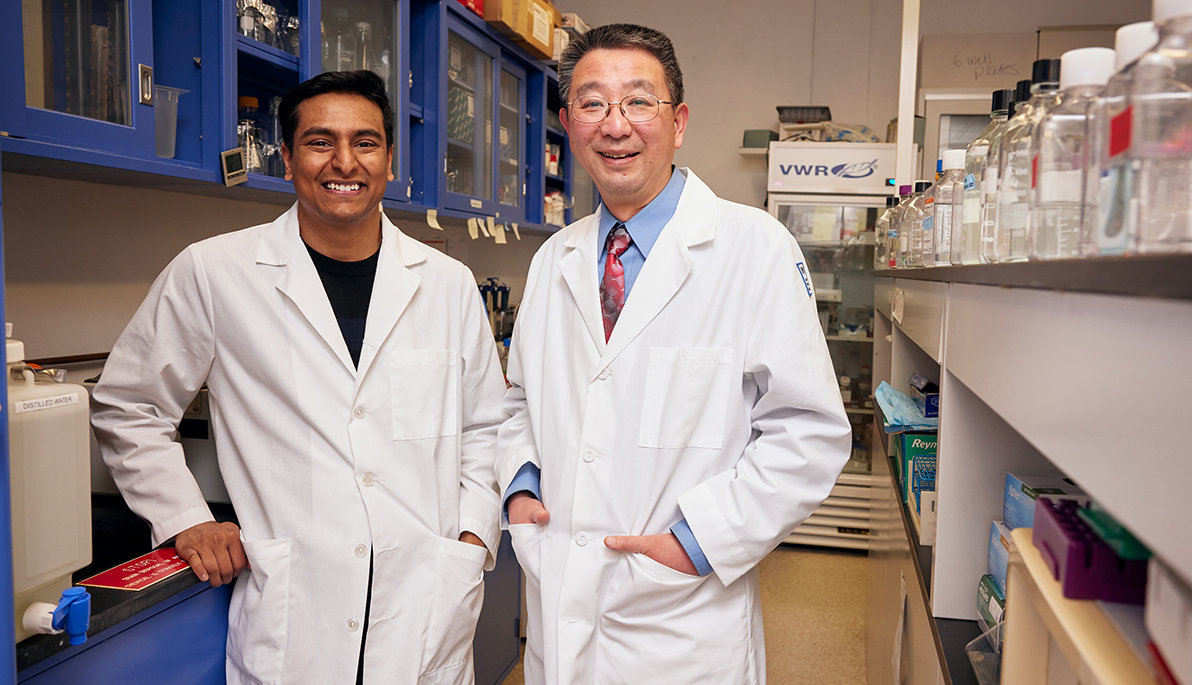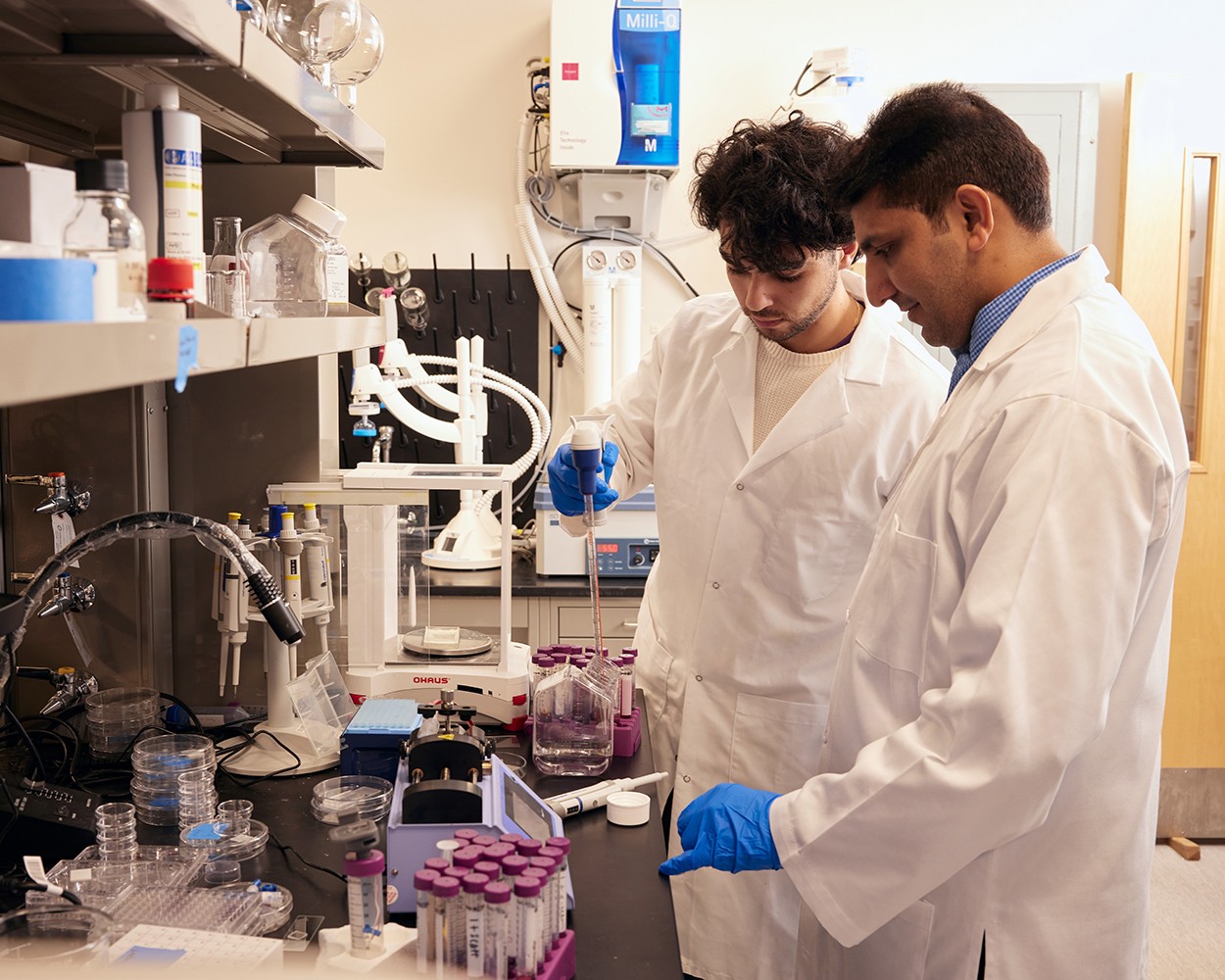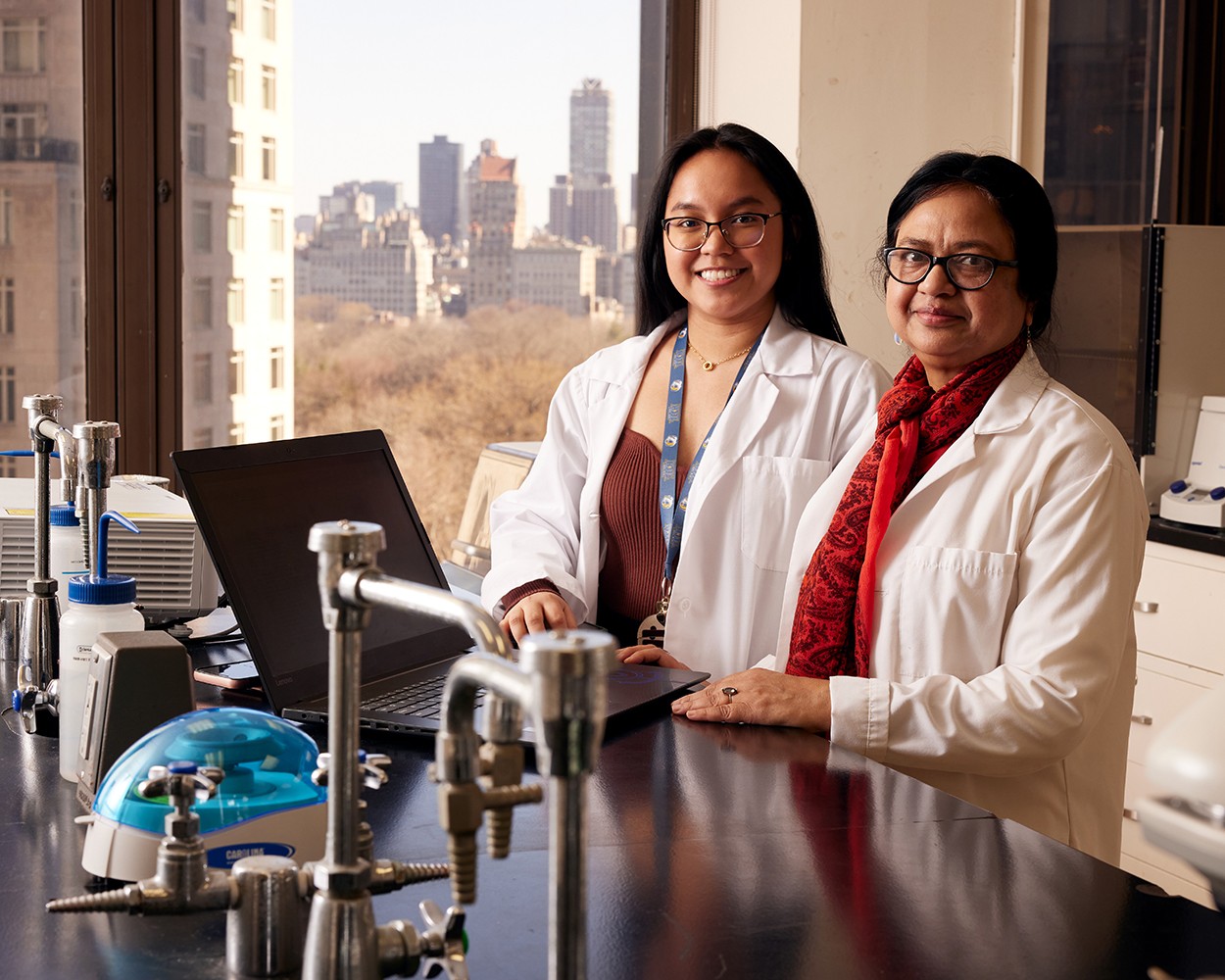
Tackling Cancer’s Thorniest Questions
August 22, 2023
New York Institute of Technology’s Center for Cancer Research brings together clinicians, scientists, and students from the Colleges of Osteopathic Medicine, Arts and Sciences, and Engineering and Computing Sciences to investigate new ways to detect, treat, and prevent cancers.
During the height of the COVID-19 pandemic when many academic and medical school research laboratories across the United States were shutting down and pausing investigations, New York Institute of Technology’s Center for Cancer Research was just getting started.
The campus-wide multidisciplinary initiative, led by Associate Professor of Biomedical Sciences Dong Zhang, Ph.D., brings together clinicians, scientists, and students from the Colleges of Osteopathic Medicine (NYITCOM), Arts and Sciences, and Engineering and Computing Sciences to tackle cancer’s thorniest questions.
“Our mission is to work together to discover novel therapies, develop new diagnostic tools, conduct translational research, and provide unique educational experiences for our students so they have better opportunities going forward,” says Zhang, whose lab focuses on DNA damage response, DNA repair, and telomere biology therapy. (Telomeres are repetitive DNA at the end of a chromosome.) For the past 30 years, Zhang has investigated the molecular function and targeted therapies for cancers with BRCA1 and BRCA2 gene mutations, the genes most affected in hereditary breast and ovarian cancer. In a study published in the Proceedings of the National Academy of Sciences (PNAS), Zhang and New York Tech colleagues identified a novel drug target to treat a particular group of cancer called the ALT-positive cancers. “Now we’re looking to raise funding to identify the inhibitor for that target and hopefully develop small molecule drugs for oncology applications,” he says.
CHARTING A PATH FORWARD
When Zhang joined New York Tech in 2014, research was starting to flourish across the institution, but the faculty involved in cancer studies remained scattered across different colleges and campuses. In 2018, that began to change when Zhang’s interaction with a colleague from the College of Engineering and Computing Sciences helped launch his idea for the Center for Cancer Research. Azhar Ilyas, Ph.D., assistant professor of electrical and computer engineering, sought faculty with cancer research expertise to help him write a National Institutes of Health (NIH) grant to fund a biomedical engineering project to detect circulating tumor cancer cells.
“I provided a letter of support for his NIH grant, and then we started talking about finding faculty from different colleges interested in joining us,” recalls Zhang. With approval from Provost and Executive Vice President Jerry Balentine, D.O., then dean of NYITCOM and vice president of medical affairs and global health, the group began organizing seminars where the faculty introduced themselves and their research. When the COVID-19 pandemic hit in March 2020, Center for Cancer Research faculty continued to meet over Zoom, brainstorming their ideas to expand cancer research and chart a path forward.
AN INCLUSIVE PATH FOR STUDENTS
“Today, it’s all about translational research and educating our students,” Zhang says.
For the last two years, Manrose “Manny” Singh, a fourth-year Doctor of Osteopathic Medicine/Doctor of Medical and Biological Sciences (D.O./Ph.D.) candidate, has worked in Zhang’s lab on a project focused on identifying the proteins and DNA repair pathways involved in telomere elongation. “The more we understand how telomeres get elongated in cancer cells, the better we can design treatments to stop this from happening,” says Singh, who has published several first-author papers in the Zhang lab.
Among Singh’s collaborators are a recent NYITCOM graduate Danny MacKenzie (D.O. ’22, CERT ’18); Associate Professor of Biomedical Sciences Randy Stout, Ph.D.; and Senior Research Associate Lars Udo-Bellner, Ph.D., who imaged the telomere fusions with advanced super-resolution microscopy techniques.
“This hands-on experience has helped me learn the fundamentals of scientific research and to think outside the box when it comes to solving scientific problems.”
Mary Margarette Sanchez
Overall, his hands-on cancer research experience at New York Tech has propelled Singh closer to his dream job: balancing clinical the laboratory. “Beyond just the data and results, I’m grateful for all the other skills that the process teaches me,” he says.
Singh is also excited for future students to benefit from New York Tech’s expansion of its cancer research through the center. “One of the underappreciated aspects is that you don’t have to be a biology major or in healthcare to be involved in cancer research,” he says. A few New York Tech students are proving this point.
For Navjot Guru, a third-year medical student in the D.O./Ph.D. program, growing up in a village in Punjab, India, before emigrating to New York in 2012 helped spark her interest in pursuing cancer research. “Witnessing health disparities within my village and lack of basic healthcare motivated me to pursue a field where I can make a difference by being involved in the solution itself,” she says. Today, Guru conducts her graduate research under the guidance of Haotian Zhao, M.D., Ph.D., NYITCOM associate professor of biomedical sciences, whose lab studies the biological processes responsible for childhood brain tumors. Guru’s project focuses on understanding the mechanism behind the choroid plexus tumor—a rare malignant pediatric tumor—examining the choroid plexus cilia pattern and its contribution to the development of tumors. As an undergraduate at Hunter College, Guru gained cancer research experience in labs at LaGuardia Community College and Memorial Sloan Kettering Cancer Center and now pays it forward by helping train undergraduate students in the Zhao lab.
NANOSCIENCE, PATHOLOGY, AND OTHER EXPERTISE TO UNRAVEL CANCER
A significant strength of the Center for Cancer Research is diversity in its faculty and student backgrounds, education, skills, and experiences.
“The center has helped broaden our understanding of cancer because everybody has different expertise,” says Ilyas, a trained engineer who heads the Bio-Nanotechnology and Biomaterials (BNB) Laboratory. His research focuses on disease diagnostics and bone regeneration using biomedical engineering, nanoscience, and nanotechnology.
In the BNB lab, Ilyas and his medical and engineering students are working on creating nanofabricated and microfluidic point-of-care (POC) devices to identify tumor cells floating in the bloodstream for early detection. When tumors get in the blood, that means the cancer is spreading in the body. After treatment, monitoring those cells could catch the metastasis early, Ilyas explains.
His co-principal investigators, Zhang and Maria Plummer, M.D., associate professor of clinical specialties at NYITCOM and a pathologist who provides tissue samples and interprets slides for the projects, offer Ilyas complementary skills that he lacks.
“As an engineer, I don’t have the clinical perspective: how many false positives or negatives were we expecting and what challenges will we face when we work with human samples,” Ilyas says. “I’m looking at the biomechanical properties of cancer cells. I can use my technology expertise to develop new devices using the nanofabrication techniques.”

Bernard Saks, left, works in the lab of Azhar Ilyas, right, to help fabricate and test devices for disease diagnostics.
Bernard Saks (B.S. ’21), a graduate student pursuing a master’s in bioengineering in the College of Engineering and Computing Sciences, helps with the fabrication and testing of the devices for disease diagnostics. Saks has worked with Ilyas in the BNB lab for the past three years researching disease diagnostics using microfluidic devices. Saks created a POC device using polydimethylsiloxane to count the circulating tumor cells and is working on developing a rapid and cost-effective HIV/AIDS diagnostic and monitoring system utilizing optical enumeration with a smartphone camera.
USING TECHNOLOGY TO TARGET CANCER CELLS
For Niharika Nath, Ph.D., a cancer biologist and professor of biological and chemical sciences in the College of Arts and Sciences, her current research on breast and cervical cells is twofold. In a collaboration with City College of New York, Nath designs medicines, such as nonsteroidal anti-inflammatory drug (NSAID) derivatives, like aspirin and ibuprofen, to release nitric oxide and other gaseous transmitters. “That can be used to inhibit the growth of tumors in animal studies and to kill cancer cells,” Nath says. “What I focus on is the different kinds of signaling molecules that we can target and how they cause cells to die.”
Over the last several years, Nath has been working on using digital technology to identify abnormal cervical cancer cells on a Pap smear using images in datasets from a hospital in rural India. The artificial intelligence technology, she says, could eventually replace manually analyzing the cells under a microscope, which can be subjective, prone to error, and take time.
“Machine learning would be beneficial if there is no pathologist on-site or can help a pathologist find the abnormal cells more efficiently or faster,” Nath says. She is also looking to categorize the tumors and fine-tune that classification with the help of machine learning.
While Nath loves finding answers to problems, mentoring New York Tech’s biomedical students is in her genes. She enjoys advising students and encouraging them to participate in research projects, submit papers to journals, and present at conferences.

Mary Margarette Sanchez, left, assists Niharika Nath, right, to identify abnormal cervical cancer cells on a Pap smear using digital technology.
Mary Margarette Sanchez, an undergrad majoring in life sciences with a concentration in biomedical engineering (now bioengineering), is among Nath’s many mentees. In the spring of 2022, Sanchez joined Nath’s volunteer project as a research assistant and has worked on two projects analyzing Pap smear images using digital technology. For her part, Sanchez helped develop a deep learning convolutional neural network (CNN) algorithm, which produced a model that trained and distinguished cervical cancer cells into normal, mild, moderate, and severe dysplastic categories.
“This hands-on experience has helped me learn the fundamentals of scientific research and to think outside the box when it comes to solving scientific problems,” says Sanchez. She is also working on a study that analyzes an entire cellular Pap smear image, rather than just the nucleus, using a dataset from the Herlev Hospital in Denmark.
Sanchez submitted her work to the Sigma Xi Student Research Showcase in May 2022 and won second place for best undergraduate research.
REAL-WORLD TRAINING FOR A BRIGHTER FUTURE
The center’s researchers hope to find more government, private, and community funding. Still, its top priority is getting students excited about science and cancer research and providing them with real-world experiences.
To that end, a new collaboration between New York Tech’s Center for Cancer Research and the Catholic Health Cancer Center Institutes, part of the Catholic Health healthcare network on Long Island, has created even more opportunities for medical students and New York Tech undergraduates. “We plan to involve undergraduates, especially the premed, life sciences, B.S./osteopathic medicine, D.O. students, in the future. However, at present, we decided to start with our medical students,” says Zhang.
The partnership allows medical students to gain practical experience working with an oncologist, which can help match them with an outstanding residency program, and undergraduates can gain experience working with physicians.
“There are a lot of exciting research programs and new opportunities happening in cancer research at New York Tech,” Zhang notes, “but interacting with and educating our students remains our biggest mission.”
This article originally appeared in the Spring 2023 issue of New York Institute of Technology Magazine.
By Amy Sacks
More Features

An Alumnus’ Commitment to the Environment
As an energy management graduate from New York Tech’s Vancouver campus, Jasdeep Gulati (M.S. ’22) is highly invested in educating people about environmental and climate sustainability.

Vancouver Faculty Win University-Sponsored Research Awards in New Program
The new Global Impact Research Grant (GIRG) program has been developed to keep Vancouver-based faculty connected to faculty and research projects being conducted on the university’s New York campuses.

Studying Climate Change One Degree at a Time
Junhua Qu (M.S. ’24) began her collegiate journey in Beijing. But, her interest in climate change took her to New York Tech’s Vancouver campus to study energy management.